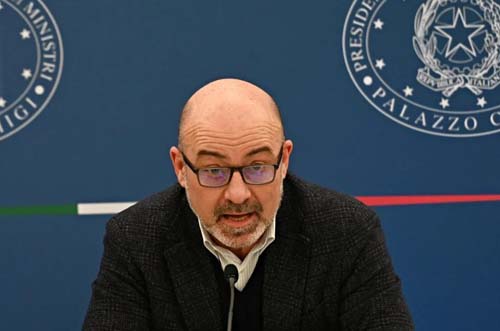
Italy asks Commission to clarify rubles-for-gas rules
Rome — Italy wants the European Commission to clearly spell out how companies can pay for Russian gas without falling afoul of sanctions levied after the invasion of Ukraine, Italian Prime Minister Mario Draghi said on Monday.
“It’s very important that the Commission expresses a clear legal opinion on whether paying in rubles is a breach of
sanctions or not,” Draghi said after a Cabinet meeting. “‘Because if there is not clarity or a line of conduct then it is clear that each company or each country will do as it believes fit.”
His comments came in the wake of Roberto Cingolani, the Italian minister in charge of energy security, saying European energy companies should provisionally be allowed to comply with Russian demands to pay for gas in rubles.
“I think at the moment the understanding is not complete from the point of view of legal issues and implications. I think it would be good for a few months, at least, to allow companies to go ahead and pay in rubles, while we understand the legal framework and implications,” he told POLITICO, adding that he wants “a speedy and very clear pronouncement from the European Commission” confirming that oil and gas companies can pay in rubles for the time being.
Draghi clarified that Italy’s position “is that of Germany, France and everyone else. We will follow the indications of the European Commission in this regard, there is no distinction between Italy and the others.”
In the meantime, Rome is preparing for a possible cutoff of Russian gas with measures to save energy, and even keep coal-fired plants operating longer.
The Kremlin has demanded energy companies from “hostile countries”— which include all EU members — pay for gas in rubles in an effort to prop up the value of the Russian currency.
Companies are supposed to open euro and ruble accounts with Russia’s Gazprombank, and the Russians would only consider the gas payment complete once the rubles have been deposited.
The European Commission has warned companies not to open ruble-denominated accounts, saying doing so would breach sanctions levied against Russia for invading Ukraine. Its guidance says utilities can pay in euros — and that such a payment would be considered final under existing contracts — and then Russia can convert them later into rubles.
For now the Kremlin insists that companies abide by its scheme. Russia’s state-controlled Gazprom cut off gas supplies to Poland and Bulgaria last week after they refused to abide by Moscow’s demand.
But Cingolani, Italy’s minister for the green transition, said it could take months to have a full understanding of the legal implications, leaving oil and gas companies in a bind.
“I believe oil and gas companies cannot risk paying and then being accused of having broken sanctions, but at the same time they cannot risk … not paying in rubles,” he said. “These are long-term contracts, the costs would be extremely high.”
His proposed workaround is similar to the Commission’s. The EU energy company would regard the euro payment as the final transaction while Russia could instead consider the ruble payment after conversion. But he acknowledged such an approach might be “optimistic.”
“In this process there are gray areas, which could constitute a breach of sanctions. However you do it there is a problem.”
European Energy Commissioner Kadri Simson on Monday confirmed that the Commission will “issue more detailed guidance on what companies can and cannot do within our sanctions framework.”
Italy is scrambling to boost gas supplies, with state-controlled energy giant Eni signing contracts with African countries. With those deals, Italy’s energy diversification is “complete,” said Cingolani, adding that Italy would be independent of Russian supplies by the end of next winter.
Even if the war ends, Rome has no plans to go back to such an overwhelming reliance on Russian supplies, he said.
“We have learned that it is not smart to have strong dependence on one country,” Cingolani said. “I knew this and I said it ahead of time, but paradoxically we are working to resolve it only because there is a war. That is a sad thing, appalling. I would have liked to do this difficult job in peacetime, rather than driven by a war.”
